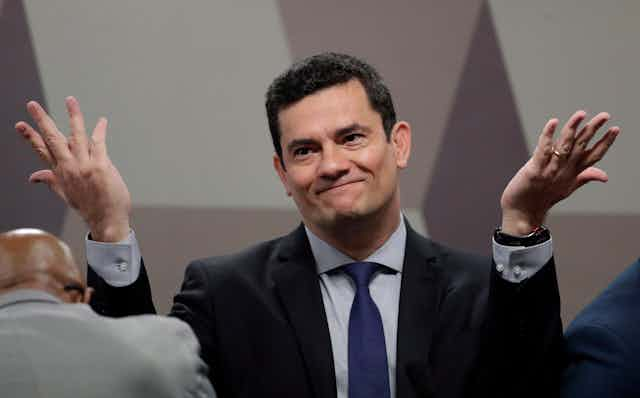Operation Car Wash is an ongoing investigation by Brazilian federal police into a money laundering scheme in which black market money dealers used small businesses to launder dirty money.
If you’ve seen TV shows like Breaking Bad or Ozark, it will seem familiar. Life apparently imitates art, since the Brazilian money-laundering started in a car wash just as it did with Walter White in Breaking Bad.
The police investigation, begun in 2014, has uncovered an enormous bribery scheme using money from Brazilian state oil. It’s been cited as one of the most successful actions against corruption in the world.
There have been 160 arrests, 184 plea bargain agreements, 159 convictions and about US$1 billion recovered, according to Brazilian public prosecutors.
It has resulted in investigations into nine former presidents from five countries in Latin America (Brazil, El Salvador, Colombia, Ecuador and Perú). Former Peruvian president Alan García killed himself in April when police arrived at his home to arrest him due to one bribery scheme involving the Brazilian building giant, Odebrecht.
One of the biggest companies involved in the scandal, Odebrecht struck a deal with the United States Justice Department in 2016, admitting it paid at least US$3.5 billion in bribes around the world.
Main characters and controversies
The main characters of the operation — former judge turned politician, Sergio Moro, and public prosecutor Deltan Dallagnol — have become famous worldwide. In May 2017, they were featured on the U.S. current affairs show 60 Minutes.
But despite its fame and fortune, Operation Car Wash has been criticized for its high number of temporary arrests, as well as convictions based on questionable evidence.
The most famous defendant is former Brazilian president Luiz Inácio Lula da Silva, who finished his second term in 2010 with a 90 per cent approval rating. Da Silva was sentenced by Moro to 12 years in prison for corruption and money laundering in July 2017.
The most popular president in Brazilian history was convicted of benefiting from renovations to a beachfront apartment, both paid by the building company OAS as payback for some contracts he helped the company get.
Da Silva has always denied all allegations, saying there’s a lack of objective evidence. However, his appeal attempts were unsuccessful and he surrendered himself into custody to begin serving his sentence in April 2018.
Six months later, newly elected president Jair Bolsonaro invited Moro to join his cabinet as minister of justice and public security. Moro accepted the invitation, resulting in much criticism. That’s because da Silva was Bolsonaro’s main rival in the polls heading into the presidential election campaign before he was arrested and barred from being a candidate.
The leaks
As a minister, Moro sent parliament an anti-crime package, and despite Bolsonaro’s decrease in popularity, he’s remained popular. Some analysts suggested the former judge could be a potential presidential candidate in the years to come. Everything was looking favourable for Moro — at least until June 9, 2019.

That’s when the website The Intercept leaked messages from Moro when he was a judge to public prosecutor Deltan Dallagnol. The instant messages, obtained by a hacker, show conversations about Operation Car Wash.
In one of the chats, Moro asked Dallagnol: “Hasn’t it been a long time without an operation?” In other messages, there were warnings against making any mistakes.
The most damning was this: “What do you think of these crazy statements from the Workers Party national board? Should we officially rebut?” The leftist Workers Party is da Silva’s.
According to the ethics code of the Brazilian magistracy, a judge must “maintain throughout the process an equivalent distance from the parties, and avoid any kind of behaviour that may reflect favouritism, predisposition or prejudice.” The Brazilian constitution also mandates judges are neutral and impartial.
The reaction to the leaks was immediate. The Brazilian Bar Association has asked for the removal of all public agents whose correspondence was revealed in the leaks.
A Brazilian Supreme Court judge called the exchange of messages “improper,” arguing that “this situation is terrible for the Brazilian judiciary’s reputation.”
‘Taken out of context’
Bolsonaro avoided the subject for five days and then defended Moro and criticized the hacking. Moro also released a statement condemning the illegal hacking into Dallognal’s phone, insisting that “there is no sign of any abnormality or providing directions” and that their conversations were “taken out of context” and sensationalized.
Ironically, in March 2016, Moro released conversations between former presidents Dilma Rousseff and da Silva. In one talk, da Silva criticized Moro, alleging a “pyrotechnical spectacle” to harm his electoral campaign for the presidency in 2018. As the chats involved a president, releasing the telephone conversations could only be authorized by the Supreme Court. Moro said he’d released them mistakenly, and apologized to the court.
It seems clear that the strategy of Bolsonaro, Moro and Dallagnol will be to focus on the positive outcomes of Operation Car Wash, painting the leaks as a war against the operation. Da Silva’s defence at his appeal, meanwhile, will be to point to possible collusion between judge and prosecutor, which could nullify the proceedings and free the former president. He was just denied a release from jail while awaiting the appeal.
What happens now depends on whether there are more messages, or whether the ones already leaked are authentic. That will be decided by the Brazilian Supreme Court, and the tensions caused by the leaked messages could divide the country even further while threatening one the most significant anti-corruption operations ever seen.
Operation Car Wash has already inspired a Netflix series called The Mechanism. Considering the new events, more than one season will likely be necessary.

